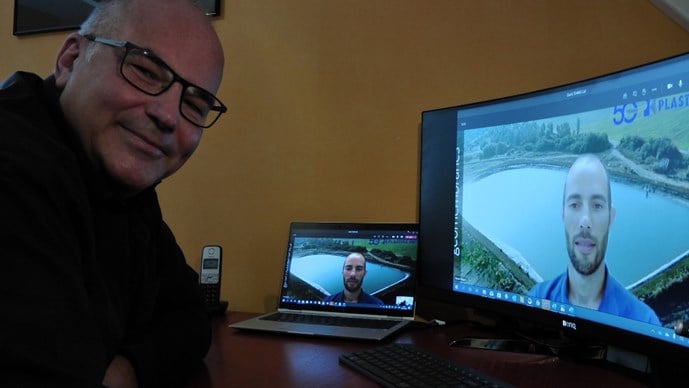Remote auditing: discover the benefits

The Covid-19 pandemic has fuelled a rise in remote working. At Kiwa, it has inspired the further development of an innovative way of working called remote auditing, and has turbocharged its implementation. Now, roughly six months into the "new normal", it’s time for a round of evaluation with auditors and customers. 'Remote audits are much less time consuming and I certainly see added value.'
'When on-site auditing isn’t possible or desirable, remote auditing has proved a really smart solution', Bert van Erkel explains. As inspection manager appliances and installations at Kiwa Netherlands, Van Erkel is one of the driving forces behind the development and implementation of remote auditing in the global Kiwa network.
What is remote auditing?
Remote auditing is very much like regular auditing, but performed differently. Van Erkel: 'In a remote or e-audit, the evidence is obtained using electronic tools. You and your auditor meet not in real life but in a secure digital environment. You can see and hear each other, share documents, discuss processes/procedures and be interviewed. Like in any regular audit, but from different locations. Thus, remote auditing offers you an efficient and fully fledged way of live auditing, compliant with all regulations and requirements – but from a safe distance. On the condition, of course, that the scheme managers allow these specific audits to be performed remotely.'
Reliable online meeting platform
Remote auditing is safe in many ways. Information exchange, report presentations and staff interviews are handled via secure and reliable online meeting tools. Van Erkel: 'Microsoft Teams, for example, is a great online platform where you can easily share and discuss information. We recommend MS Teams for stability, security and ease of operation. But upon request we can also arrange remote audits via other online platforms, provided they are up to the same high security standards.'
What types of audits can be performed remotely?
For selected aspects, remote audits are as in-depth and detailed as regular on-site audits, offering the same high quality and service. 'We’ve found that remote auditing is particularly useful for documentation review, records evaluation in information systems and interviews with staff or management at different locations,' Van Erkel explains. For specific kinds of audits, though, on-site visits are still necessary. 'For example, standards including requirements for physical security such as ISO/IEC27001 or environmental matters like ISO14001 need additional on-site visits. In some cases, you just have to have the "boots on the ground".'
In practice: major advantages
Since mid-2020, Kiwa has carried out many remote audits around the world, gaining extensive experience with this new, highly efficient method. Remote auditing "the Kiwa way" has been shown to offer a number of major advantages. Van Erkel: 'Remote auditing allows much of the auditing work to be carried out despite travel or meeting restrictions.' As well as health-related advantages, this helps keep business processes and market introductions up to speed, says Van Erkel. 'Where Covid-19 restrictions might cause live on-site audits to be postponed, remote audits of, say, new products and services can proceed as planned. Remote auditing also means fewer auditors on the work floor, which reduces disruption to working routines. So it’s more efficient. On top of all that, there’s less travelling for staff and auditors. That saves time, cuts costs and reduces the CO2 footprint.'

Photo: Bert van Erkel performing a remote audit with Plastika Kritis, producer of masterbatches and agricultural films, based in Kreta.
Stories from around the world
Would you like to know how our Kiwa colleagues use their expertise to help shape a better, more sustainable and fair world?
Contact us
If you have specific questions about inspections or if you haven't found what you were looking for, please do not hesitate to contact us.